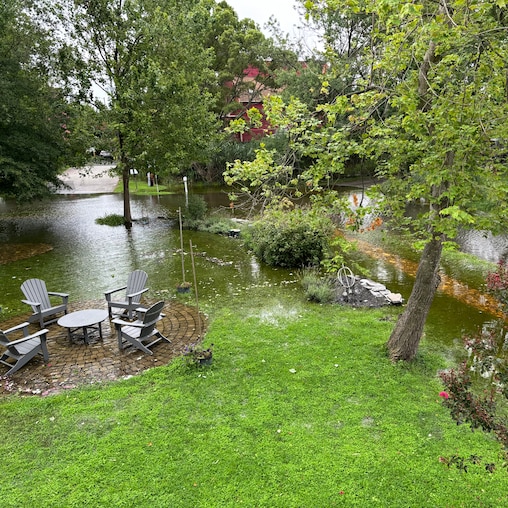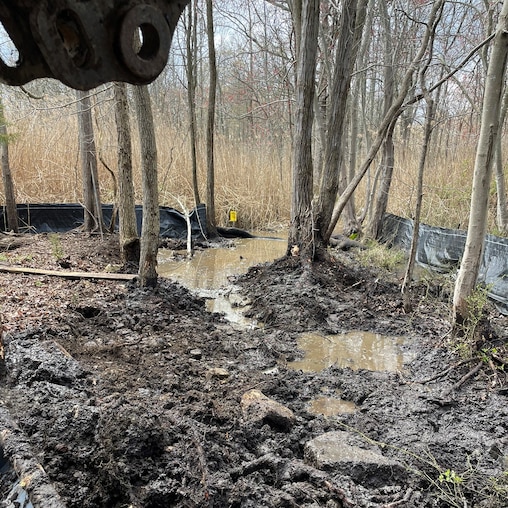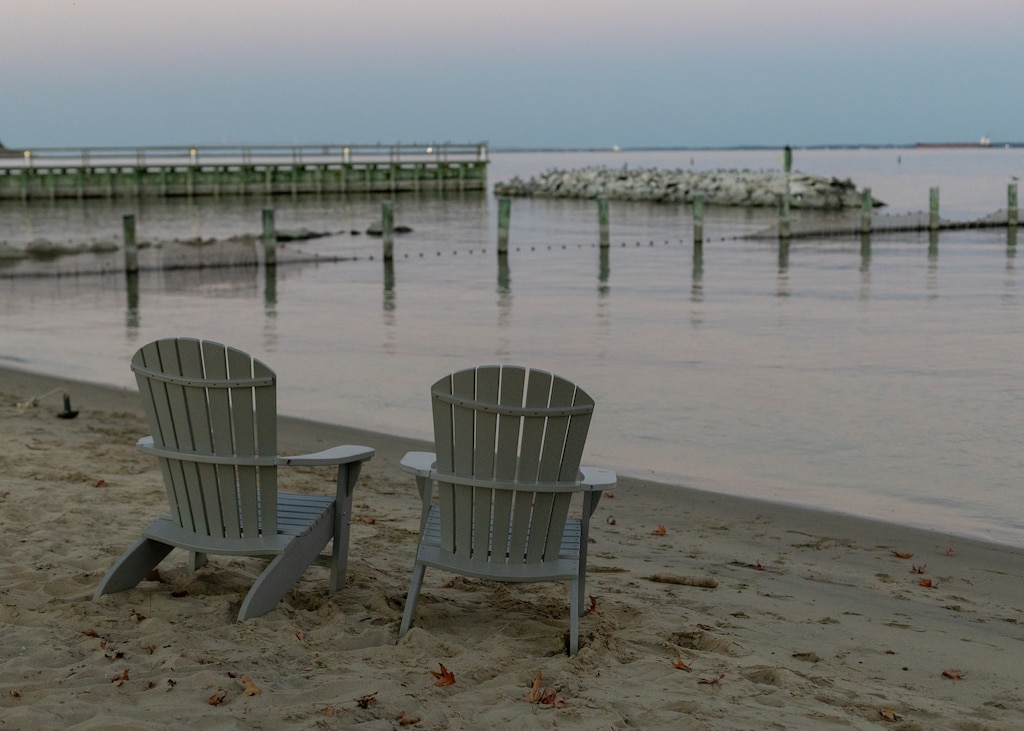Just about everybody in Oyster Harbor liked the affable president of their citizens association. Eric Epstein, a sailor with a knack for a good yarn, volunteered year after year for a job no one wanted. He cheerfully handled road repairs, leased boat slips and hosted happy hours, where neighbors bonded over drinks at a breezy private beach.
But after two years of turmoil over tangled finances, a police investigation and a state-ordered cleanup of fragile wetlands, many in this close-knit community outside Annapolis say Epstein wasn’t a good neighbor after all.
“He betrayed us all,” said Gerald Winegrad, a former state senator known for his environmental activism, whose home overlooks Oyster Creek. Winegrad, who considered Epstein “my friend,” was among the first to raise questions about the now ex-president.
Epstein, who is 63 and a semi-retired tech and yacht services consultant, is accused by Anne Arundel County Police of stealing $18,300 in community funds to pay his cable and veterinarian bills. A Nov. 4 trial is scheduled in Anne Arundel County District Court on four felony theft counts and a misdemeanor charge of embezzlement. If convicted of all charges, he would face up to a $40,000 fine and 35 years in jail, though sentencing for lower-level financial crimes is typically far less.
In an interview, Epstein called the charges “bizarre.” While declining to elaborate beyond saying he needed cable service for his community work, Epstein said: “Everything I did was aboveboard.” He blamed the theft allegations on a “vendetta by a few pissed-off people,” saying “it’s very nasty,” and vowed to “beat anything that’s brought against me.”
His prosecution is the latest turn in a saga that’s shaken Oyster Harbor, a historically Black summer retreat, which has held onto the simpler, unhurried ways of an earlier Annapolis.
Oyster Harbor took shape in the early 1950s, in an era of segregated Chesapeake Bay beaches. It offered Black families a welcoming place to fish and swim, across the creek from Highland Beach, the first Black town to incorporate in Maryland. Now year-round and predominantly white, the small enclave of 382 cottages and million-dollar rebuilds is still independent, maintaining its own streets, playgrounds and a secluded beach with views of the Bay Bridge.
By the time Epstein stepped down in fall 2022, after nine years as president, Oyster Harbor was embroiled in a heated dispute over a golf-cart trail he had authorized in an undisturbed stretch of tidal marsh. Nearby residents protested the project was diverting runoff into their yards, triggering an investigation by the Maryland Department of the Environment, a $5,000 fine and the costly clearing of more than 200 tons of rubble, stones and mulch.
But the controversy over what the state deemed an “illegal trail” was only the beginning. The citizens board soon discovered Epstein, apparently without telling anyone, had applied for a $1.4 million grant to buy out the owner of seven small lots located in the marshland — at 10 times their original value. A copy of the grant application to the National Fish and Wildlife Foundation shows Epstein sketched out a rough concept for a wilderness park and pledged $50,000 in community funds. The conservation nonprofit turned it down.
 Homeowners in Oyster Harbor are battling frequent flooding, shown here in a photo from a resident, that they say has been exacerbated by drainage work that was never done.
Homeowners in Oyster Harbor are battling frequent flooding, shown here in a photo from a resident, that they say has been exacerbated by drainage work that was never done.  A photo from a resident shows the start of a state-ordered cleanup of tons of rubble and stone in fragile wetlands.
A photo from a resident shows the start of a state-ordered cleanup of tons of rubble and stone in fragile wetlands.
Caught off-guard, the board ordered an outside audit of Oyster Harbor’s finances, which uncovered multiple discrepancies and irregular invoices from 2016 to 2022, according to three board members and nearly 60 pages of association records. Meanwhile, a group of homeowners complained the community had been billed for flood-control work that was never done.
As a result, the Oyster Harbor Citizens Association recently reported it owes the county $90,000 — on top the $80,000 it repaid in “missing or misspent” tax funds. County police have charged Epstein with misappropriating a small amount but concluded other alleged discrepancies were “civil matters” up to the board to pursue, said police spokesman Justin Mulcahy. Epstein denied that any money was misused.
The association, which also has spent at least $50,000 on the audit and legal fees, filed an insurance claim for $170,000 in May.
Oyster Harbor, one of 62 “special tax districts” in the county, collects $400,000 a year from a surcharge tacked onto residents’ property bills. The additional revenue is supposed to go to clearly defined community projects, like snow removal or shoreline erosion. But the county relies on community associations, usually run by volunteers, to enforce how money is spent.
At Oyster Harbor, the audit found, Epstein had opened a separate bank account for pier maintenance and transferred $270,000 in small installments over six years. Not all the money went to fixing the aging piers.
More than $35,000 was withdrawn in cash, described as “tips for landscapers,” the audit found. A Nashville singer was paid $6,000 for a promotional YouTube video. Another $16,000 went to STEM grants and Lego kits for local schools, with thousands more for a dog wash, WiFi upgrades and beer for beach parties. The board determined none met its spending rules.
“It was a surprise. We did not approve these transfers,” said Winston Dunkley, a longtime board member, who spent months double-checking minutes and financial statements. He partly blames himself. “We were too trusting,” he said, adding he, too, found Epstein “charming.”
The audit findings prompted some residents to email the board, demanding to know why money was paid for paving and drainage repairs they say never occurred. Among them was Thomasina Coates, who wants help with frequent stormwater swamping her yard and driveway. Epstein promised to put in a rain garden, she said, and make other improvements. But while the association was billed $8,000, according to financial statements, she’s still waiting.
“People have eyes; they can see if something is done,” said Coates, a Charles County commissioner who spends weekends at a traditional bayfront cottage her in-laws built in 1988. “I just need my drainage fixed. Water is flowing from every direction, left and right, the hill above. I had ducks in there. They thought it was a pond.”
For his part, Epstein, who still lives in Oyster Harbor, said he has provided receipts for every expense and assumed all the drainage work that he authorized had been completed. He only opened a new bank account for pier maintenance, he said, because using an ATM card was easier than writing checks from the main fund. Epstein, whose LinkedIn profile describes him as a Marine veteran, STEM volunteer and owner of several startup businesses, also said he doesn’t believe the county is owed a refund.
“The community created the problem” with the audit, he said, “and then told the county they had a problem, and now they have to pay it back. Somehow, I’m being pegged for everything. I am not what has been presented to you. I’m an easygoing guy who leads a very simple life.”
For many homeowners in once-quiet Oyster Harbor, the months of meetings, threats of lawsuits and indignant texts have taken a toll. Board Secretary Nancy Plaxico, while releasing a statement that the board was “fully cooperating” with the police investigation, sighed and acknowledged, ”It has been stressful.”
Some fear a fraying of the neighborly spirit — the casual cookouts, kids riding bikes and retirees casting lines from the community dock. Oyster Harbor takes pride in remaining low-key even as Annapolis’ waterfront areas have become increasingly wealthy and exclusive. Folks here still recall cleaning up together after Tropical Storm Isabel smashed into the seawall and damaged homes in 2003. Said Plaxico: “We want to keep that history and spirit.”
But others agree with Dunkley, who argues the best way forward is through “accountability.”
At 71, Dunkley still recalls his first glimpse of Oyster Harbor like a montage — “flashes of water, the eclectic housing, the people outside.” It reminded him of Jamaica, where he was born. He left manicured Montgomery County in 2002, built an airy home and never looked back.
Unlike some of his neighbors, Dunkley believes that despite “a lot of upheaval,” the neighborhood will emerge stronger. Oyster Harbor has now hired a professional management company. And last month, more than 100 homeowners voted in a new president and three first-time board members, who have promised to track expenses closely and be more responsive.
“I love this community,” Dunkley said, “and I do not use that word loosely. You can meet people from all walks of life here. Walking my dog, talking to people, looking at the water. It’s idyllic.”
 An idyllic view of the Oyster Habor private beach. (KT Kanazawich for The Baltimore Banner)
An idyllic view of the Oyster Habor private beach. (KT Kanazawich for The Baltimore Banner)
Source link : http://www.bing.com/news/apiclick.aspx?ref=FexRss&aid=&tid=670ce759679b46bc8801daabd175783b&url=https%3A%2F%2Fwww.thebaltimorebanner.com%2Fcommunity%2Fcriminal-justice%2Foyster-harbor-eric-epstein-C3MRYWMY45CSRBEIGXCBNDTXPU%2F&c=3444351675405202378&mkt=en-us
Author :
Publish date : 2024-10-13 22:38:00
Copyright for syndicated content belongs to the linked Source.









